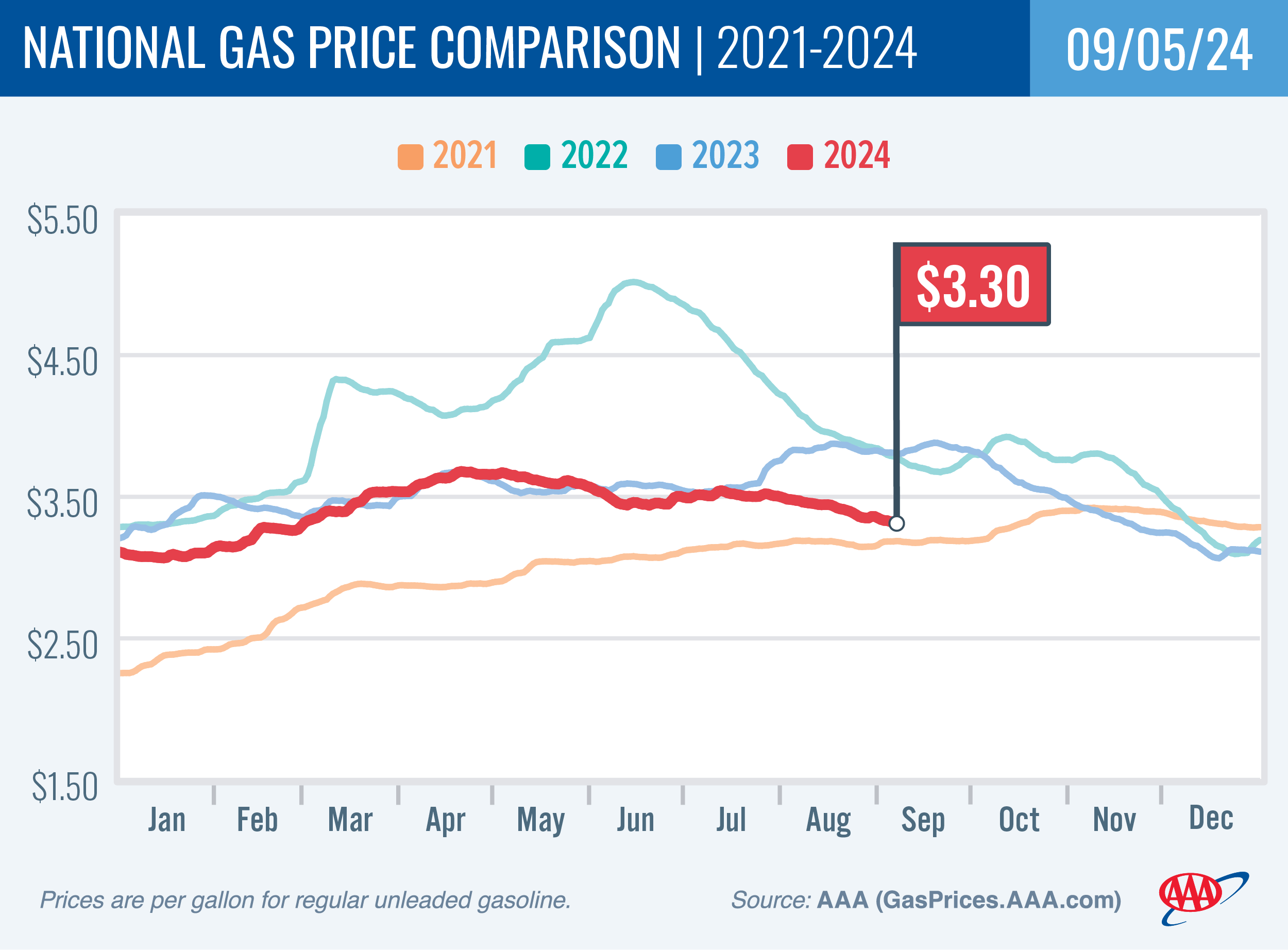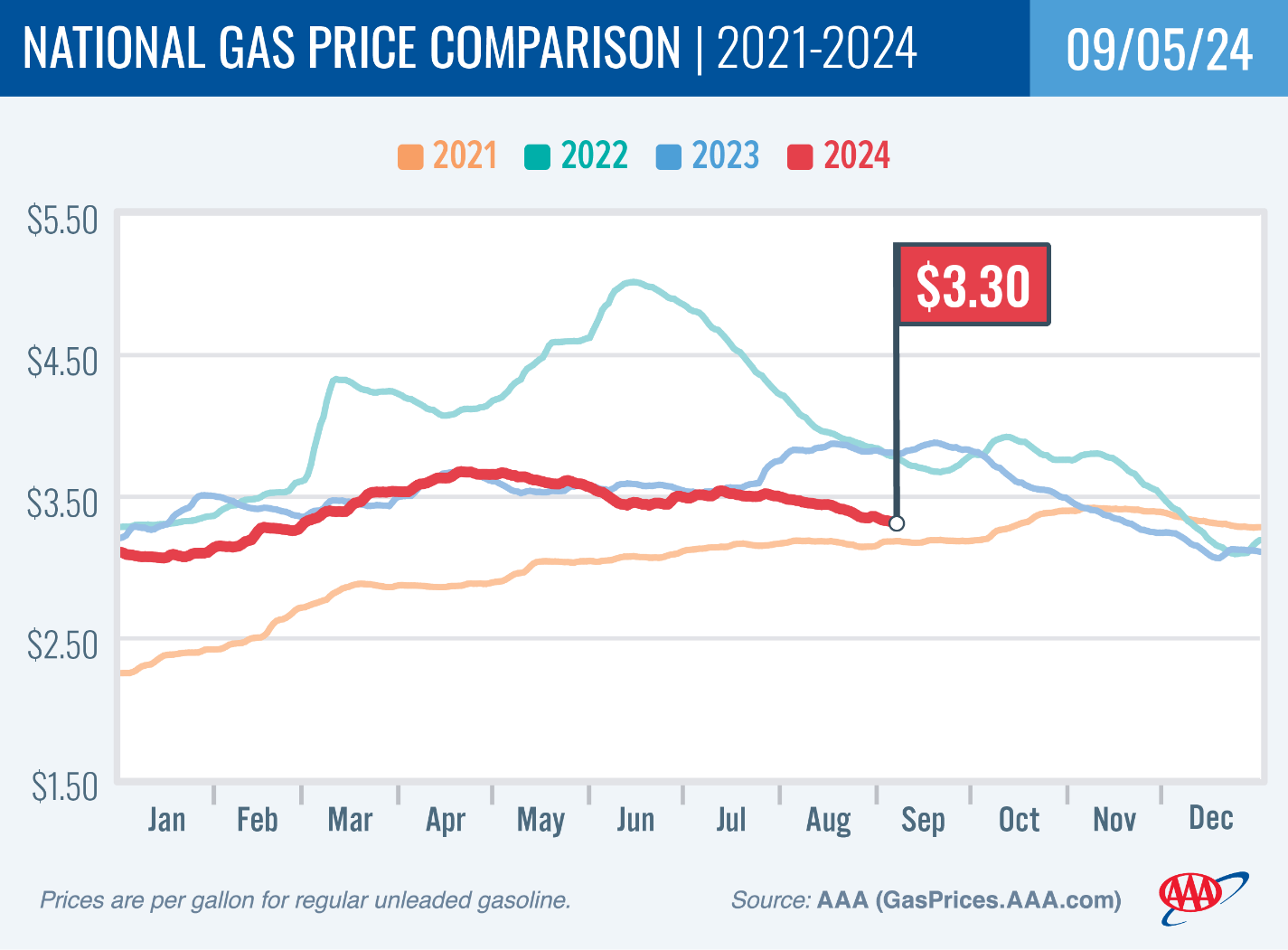A Sixth Sense About Six Cents? I See Dea… I Mean Falling Gas Prices
A Sixth Sense About Six Cents? I See Dea… I Mean Falling Gas Prices

After idling over the Labor Day weekend, the national average for a gallon of gas resumed its pace of daily declines by falling six cents since last week to $3.30. Key contributors are low gas demand and the plunging cost of oil, which is struggling to stay above $70 a barrel. The national average cost for L2 commercial electricity remained the same for EV drivers.
“There are now ten states with gasoline averages below $3 a gallon, which means thousands of retail outlets east of the Rockies are selling gas at similarly low prices,” said Andrew Gross, AAA spokesperson. “With hurricane season remaining weak and disorganized, this trend of falling pump prices will likely continue.”
With an estimated 1.2 million AAA members living in households with one or more electric vehicles, AAA tracks the kilowatt-per-hour cost for Level 2 (L2) commercial charging by state.
Today's national average for a kilowatt of electricity at an L2 commercial charging station is 34 cents.
According to new data from the Energy Information Administration (EIA), gas demand fell last week from 9.30 million b/d to 8.93. Meanwhile, total domestic gasoline stocks rose slightly from 218.4 to 219.2 million barrels, and gasoline production increased last week, averaging 9.7 million daily. Falling gasoline demand and oil costs will likely keep pump prices sliding.
Today’s national average for a gallon of gas is $3.30, 17 cents less than a month ago and 51 cents less than a year ago.

Oil Market Dynamics
At the close of Wednesday’s formal trading session, WTI fell by $1.14 to settle at $69.20 a barrel. The EIA reports that crude oil inventories decreased by 6.9 million barrels from the previous week. At 418.3 million barrels, U.S. crude oil inventories are about 5% below the five-year average for this time of year.
Quick Gas and Electricity Stats
Gas
The nation's top 10 most expensive gasoline markets are Hawaii ($4.66), California ($4.65), Washington ($4.16), Nevada ($3.99), Oregon ($3.76), Alaska ($3.72), Illinois ($3.61), Utah ($3.59), Idaho ($3.58), and Washington, D.C. ($3.55)
The nation's top 10 least expensive gasoline markets are Mississippi ($2.83), Tennessee ($2.94), Oklahoma ($2.88), Alabama ($2.90), Texas ($2.90), Louisiana ($2.90), South Carolina ($2.93), Arkansas ($2.95), Missouri ($2.98), and Kentucky ($2.99).
Electric
The nation’s top 10 least expensive states for L2 commercial charging per kilowatt hour are Kansas (22 cents), Missouri (24 cents), Delaware (25 cents), Texas (28 cents), Nebraska (29 cents), Utah (29 cents), Wisconsin (29 cents,) Michigan (30 cents), Vermont (30 cents) and North Dakota (30 cents).
The nation’s top 10 most expensive states for L2 commercial charging per kilowatt hour are Hawaii (56 cents), West Virginia (45 cents), South Dakota (43 cents), Arkansas (42 cents), Idaho (42 cents), South Carolina (42 cents), Montana (41 cents), Kentucky (41 cents), New Hampshire (41 cents) and Alaska (40 cents).
Drivers can find current gas and electric charging prices along their route using the AAA TripTik Travel planner.



